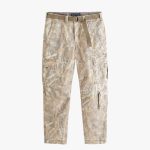The “why,” ultimately, is not all that complicated—or at least not as complicated as the media found it in 1999. It wasn’t one thing, exactly. The Lions kept losing, and kept letting cornerstone teammates join other teams. It’s suggested, too, that seeing two different teammates suffer serious spinal cord injuries might have shaped his thinking. In any case, Sanders says in the film, “Somewhere along the line I felt that drive, and that passion to play the game, it was different.” He knew that the 1998 week 17 game against the Ravens would be his last, even if nobody else did.
Watching the movie, I mostly found myself embarrassed that we had spent so much time hounding Sanders for an explanation in the first place. Lots, of course, has changed since Sanders retired. We are generally speaking far more sympathetic to athletes than we were back then, and far more comfortable with the idea that they ought to have a meaningful say in how their careers proceed. In his playing days, Sanders told me, he and his teammates would look at their peers in the NBA and envy the degree of control they seemed to have. “It was always a part of the players thinking that one day we’d like to have more this or that or the other, more control over what happens,” he says. (NBA players, of course, had plenty of respect for Sanders, too: he tells me about meeting a young Kobe Bryant, who explained that he’d patterned his spin move after Sanders’.)
Seen in this context, Sanders’ decision makes a little more sense. (And, in recent years, has been echoed by NFL players like Andrew Luck and Rob Gronkowski.) The idea that Sanders owed us something besides his brilliant play—and to a franchise as negligent as his, at that—has aged poorly. A few nights before my morning with Sanders, I had dinner with an old friend of mine—a Michigan native, and a Lions fan. I asked him why he thought Sanders had retired when he did. I thought it was obvious, he said. Wasn’t he just sick of the bullshit?
In any case, the “why” of Sanders’ retirement isn’t quite as interesting as the “how.” The last bit of Bye Bye Barry is set, somewhat surprisingly, in London. There’s a reason for this: I’d forgotten, or maybe was too young to have noticed, that the same day he announced his retirement, Sanders was spotted at Gatwick Airport in London. He’d left Detroit to get away for a few days, and of course ran into paparazzi.
The film gives him a second chance at the trip—this time with his four sons, who range in age from 16 to 29 and are appropriately baffled by the circumstances of their dad’s retirement. “It was a little strange,” Sanders says of their time in London, “because I felt like I had to answer the question instead of just brushing them off—giving a parent answer, like Leave me alone, I’m busy right now, or Go to your room.”None of his sons seem to know exactly why their dad hung it up. (They’re also not totally clear on how fax machines work.) He makes it as clear as he can: he just didn’t feel like doing it anymore.
Back on the golf course, we finish our leisurely nine holes, thankful nobody’s been keeping score. At one point, Sanders’ ball winds up in a sprinkler head just off the green. He asks if he can take a drop; of course you can, Barry Sanders, we all say. He moves his ball to the fringe, and sinks a 30-foot putt. He doesn’t really celebrate. He’s been there before.



